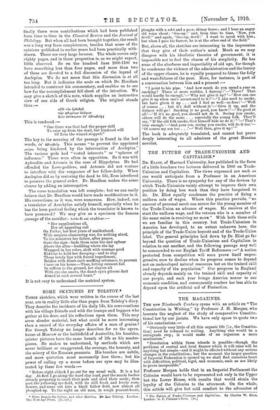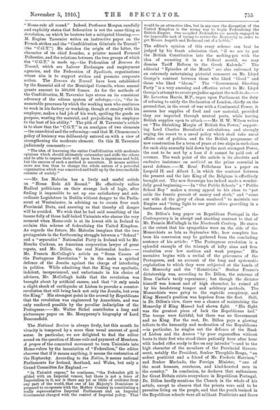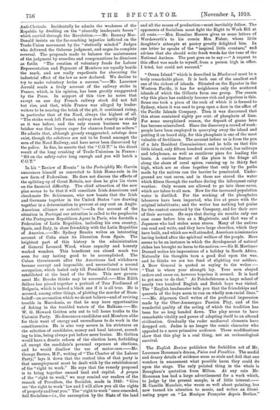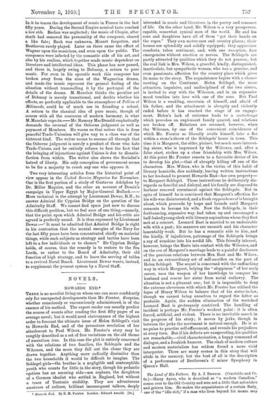THE MAGAZINES.
THE new Nineteenth. Century opens with an article on "The
Constitution in Writing," by Professor J. H. Morgan, who laments the neglect of the study of comparative Constitu- tional law by our jurists. We have only space to quote two of his conclusions:—
"Obviously very little of all this organic life [i.e., the Constitu- tion] need be reduced to writing. Anything else would be a retrograde step ; it would make of an organism a mere mechanism."
"Devolution within these islands is possible—though the problems of central and local finance which it will raise will be anything but simple—and it might be effected without any serious changes in the constitution ; but the moment the larger question of Imperial Federation is opened up we shall find ourselves beset with difficulties, political, legal, and economic, such as are likely to prove insuperable."
Professor Morgan holds that in an Imperial Parliament the Colonies would have to be represented not only in the Upper but the Lower House, with results that would strain the loyalty of the Colonies to the uttermost. On the whole, this article will give but cold comfort to the advocates of
• The Future of Trades-Unionism and Capitalism. By Charles W. Eliot. 'Condon: G. P. Putnam's Sons. [4s.]
" Home-rule all round." Indeed, Professor Morgan carefully and explicitly states that federation is not the same thing as devolution, on which he bestows but a mitigated blessing.
M. Eugene Tavernier writes an instructive paper on the French strikes and the "Confederation Generale du Travail" (the " C.G.T.") He sketches the origin of the latter, the character of its chief founder, a printer named Fernand
Pelloutier, and the relations between the two groups of which the " C.G.T." is made up,—the Federation of Bourses du Travail, which are Labour Exchanges and employment agencies, and the Federation of Syndicate, organisations whose aim is to support strikes and promote corporate action. The Bourses du Travail have been established by the financial aid of the Municipal Councils, whose annual grants amount to 500,000 francs. As for the methods of the Confederation, M. Tavernier lays stress on its consistent advocacy of the odious system of sabotage,—i.e., "the in-
numerable processes by which the working man who continues to work in his factory or workshop, though at enmity with his employer, makes a bad job of his work, spoiling the goods on purpose, wasting the material, and prejudicing his employer to the best of his ability." The pith of M. Tavernier's article is to show that the " C.G.T." is an amalgam of two elements —the anarchical and the reforming—and that M. Clemenceau's policy of leniency was deliberately entered on with a view of strengthening the moderate element. On this M. Tavernier judiciously comments :—
"The idea of leavening the entire Confederation with moderate opinions which should ultimately outnumber and stifle the others and be able to impose their will upon them is ingenious and bold, but the success of such a method is uncertain. It means neither more nor less than to change the whole nature of a powerful .organisation which was conceived and built up by the irreconcilable enemies of society."
—Mr. Ian Malcolm has a lively and useful article on "Home Rule All Round." He effectively rallies Radical politicians on their strange lack of logic, after finding it impossible to set up one satisfactory and sub- ordinate Legislature in Dublin without danger to the Parlia- ment at Westminster, in advising us to create four such Provincial Diets, and assuring us that thereby all danger will be avoided. We wish that he bad said something of the insane folly of those half-baked Unionists who choose the very
moment when Home-rule is at its lowest ebb in Ireland to acclaim this scheme of federalising the United Kingdom.
As regards the future, Mr. Malcolm imagines that the two protagonists in the forthcoming struggle between a "federal" and a " separatist " Nationalist Party in Ireland will be Mr. Bourke Cochran, an American corporation lawyer of great repute, and Mr. Dillon, the real Nationalist leader.
Mr. Francis McCullagh's article on "Some Causes of the Portuguese Revolution" is in the main a spirited defence of the Jesuits against the charge of interfering in politics. While admitting that the King was apathetic, indolent, inexperienced, and unfortunate in his choice of advisers, Mr. McCullagh holds that the revolution was brought about by artificial causes, and that "it only needs a slight shock of earthquake at Lisbon to provoke a counter- revolution that will bring back not only the Jesuits, but even the King." His strongest point is the avowal by Republicans that the revolution was engineered by Anarchists, and was only rendered possible by the • peculiar indiscipline of the Portuguese.—Mr. Walter Sichel contributes a long and picturesque paper on Mr. Monypenny's biography of Lord Beaconsfield.
The National Review is always lively, but this month its vivacity is tempered by a more than usual amount of good sense. In particular, we are delighted to find the editor sound on the question of Home-rule and payment of Members. A propos of the concerted movement to turn Unionists into
Home-rulers by the incantation of "Federalism," the editor observes that if it means anything, it means the restoration of
the Heptarchy. According to the Nation, it means national Parliaments for Ireland, Scotland, and Wales, but only a
Grand Committee for England :—
" In Unionist organs," he continues, "the Federalist pill is gilded with an Imperial veneer, but there is not a trace of Imperialism in it, nor is there any jot or tittle of evidence from any part of the world, that one of his Majesty's Dominions is prepared to co-operate with the Mother Country in constituting a really representative Imperial Parliament and an Imperial Government charged with the control of Imperial policy. That
would be an attractive idea, but in any case the disruption of the United Kingdom is the wrong way to begin Federalising the British Empire. Our so-called Federalists are merely engaged in the impossible task of trying to revive the lieptarchy in order to get Messrs. Asquith and Redmond out of a hobble."
The editor's opinion of this crazy scheme can best be judged by his frank admission that, if we are to put the British Constitution into the melting-pot with the idea of recasting it in a Federal mould, we may dismiss Tariff Reform to the Greek Kalende." The editorial "Episodes of the Month" are also enlivened by an extremely entertaining pictorial comment on Mr. Lloyd George's contrast between those who liked " blood " and those who liked "bloom." The "Government Shooting Party" is a very amusing and effective retort to Mr. Lloyd
George's attempt to create prejudice against the well-to do.—
Mr. Leverton Harris, urges upon Parliament the duty of refusing to ratify the Declaration of London, chiefly on the ground that, in the event of war with a Continental Power, it
assures her supplies of food and raw material, provided they are imported through neutral ports, while leaving British supplies open to attack.--Mr. H. W. Wilson writes on "The Shrinking Margin of British Sea Power," support- ing Lord Charles Beresford's calculations, and strongly urging the resort to a naval policy which shall take naval
affairs out of politics, and fix the British programme of new construction for a term of years at two ships in each class for each ship annually laid down by the next strongest Power,
the cost to be met by a loan if it cannot be paid out of revenue. The weak point of the article is its absolute and exclusive insistence on materiel as the prime essential in naval defence.—M. Rene Feibelman has a paper on
Leopold IL and Albert I., in which the contrast between the present and the late King of the Belgians is effectively brought out. The new Sovereign has indeed made a wonder- fully good beginning.—In "Our Public Schools" a "Public School Boy" makes a strong appeal to his class to "put aside the frantic pursuit of money and sloth," and "come out with all the glory of clean manhood" to maintain our Empire and "bring light to our great cities grovelling in a loathsome darkness."
Dr. Dillon's long paper on Republican Portugal in the Contemporary is in abrupt and startling contrast to that of Mr. Francis McCullagh in the Nineteenth Century. He states at the outset that hie sympathies were on the side of the Monarchists as late as September 8th ; how complete has been his conversion may be gathered from the concluding sentence of his article : "The Portuguese revolution is a
splendid example of the triumph of lofty aims and firm resolution over low motives and weak purpose." His narrative begins with a recital of the grievances of the Portuguese, and an account of the long and systematic exploitation to which they were subjected at the hands of the Monarchy and the " Rotativists." Senhor Franco's dictatorship was, according to Dr. Dillon, the outcome of Dom Carlos's tardy repentance ; but though the dictator
himself was honest and of high character, he ruined all by his headstrong temper and arbitrary methods. The Monarchists were privy to the regicide conspiracy, and King Manoel's position was hopeless from the first. Still, in Dr. Dillon's view, there was a chance of maintaining the
Monarchy if King Manoel had shown fight. "His flight was the greatest piece of luck the Republicans had."
The troops were faithful, but there was no Government and no King. For the rest, Dr. Dillon pays a glowing tribute to the humanity and moderation of the Republicans —in particular, he singles out the defence of the Bank of Lisbon and the Azores "by poor ragamuffins without boots to their feet who stood there patiently hour after hour with loaded rifles ready to fire on any intruder "—and to the high character of the members of the Provincial Govern- ment, notably the President, Senhor Theophilo Braga, "an ardent positivist and a friend of Mr. Frederic Harrison," and Senhor Machado, the Foreign Minister, "one of the most humane, courteous, and kind-hearted men in the country." In conclusion, he declares that enthusiasm for Great Britain exists everywhere in Republican Portugal. Dr. Dillon hardly mentions the Church in the whole of his article, except to observe that the priests were said to be parasites living on the people, and that the youth trained in. the Republican schools were all militant Positivists and fierce
.Anti-Clericals. Incidentally he admits the weakness of the Republic by dwelling on the "absurdly inadequate forces" which carried through the Revolution.—Mr. Ramsay Mac- Donald insists on the far-reaching injustice inflicted on the Trade-Union movement by the "statically minded" Judges who delivered the Osborne judgment, and urges its complete reversal. The proposals made to balance the maintenance of the judgment by remedies and compensations he dismisses as futile. "The creation of voluntary funds for Labour Representation and Payment of Members are equally beside the mark, and are really expedients for obscuring the industrial effect of the law as now declared. We decline to try to make voluntary levies a success."—Mr. Laurence Jerrold sends a lively account of the railway strike in France, which, in his opinion, has been greatly exaggerated by the Press. In support of this view he notes that except on one day French railway stock did not fall but rise, and that, while France was alleged by leader- writers to be nearing the brink of the pit, it continued rising, in particular that of the Nord, always the highest of all. "The strike week left French railway stock exactly as steady as it was before, and the only reason business was no brisker was that buyers eager for chances found no sellers." He admits that, although grossly exaggerated, sabotage does exist, though the saboteurs are not to be found amongst the men of the Nord Railway, and have never been discovered by the police. In fine, he asserts that the " C.G.T." is the direct result of the long crushing of Trade-Unionism in France : "Sit on the safety-valve long enough and you will hatch a C.G.T."
In his "Review of Events" in the Fortnightly Mr. Garvin announces himself as converted to Irish Home-rule in its new form of Federalism. He does not discuss the effects of the splitting up of Great Britain, nor does he give his views on the financial difficulty. The chief attraction of the new plan seems to be that it will conciliate Irish-Americans and checkmate Dr. Schiemann, who now boasts that the Irish and Germans together in the United States "are drawing together in a determination to prevent at any cost an Anglo- American alliance or entente."—In the account of the situation in Portugal our attention is called to the prophecies of the Portuguese Republican Agent in Paris, who foretells a Federation of Latin Republics, including his own country, Spain, and Italy, in close friendship with the Latin Republics of America.—Mr. Sydney Brooks writes an interesting account of Cuba since its liberation from Spain. The brightest part of this history is the administration of General Leonard Wood, whose capacity and honesty worked wonders. This beneficent era closed much too soon for any lasting good to be accomplished. The Cuban Government after the Americans had withdrawn became corrupt and impossible, and necessitated a second occupation, which lasted only till President Gomez had been established at the head of the State. This new govern- ment Mr. Brooks thinks may be successful.—Miss Edith Sellers has pieced together a portrait of Tsar Ferdinand of Bulgaria, which is indeed a black one if it is all true. He is accused, among other things, of plotting the murder of Stam- buloff—an accusation which we do not believe—and of reviving trouble in Macedonia, so that he may have opportunities of fishing in the troubled waters of the Balkans.—Mr. W. G. Howard Gritten sets out to tell home truths to the Unionist Party. He denounces candidates and Members alike for their want of energy and unreadiness to do work in the constituencies. He is also very severe in his strictures on the selection of candidates, money and local interest, accord- ing to him, being always put before mere brains. Mr. Gritten would have a drastic reform of the election laws, forbidding all except the candidate's personal expenses at elections, and he would disallow the use of motor-cars.—Mr. George Barnes, M.P., writing of "The Charter of the Labour Party," lays it down that the central idea of that party is that unemployment must be dealt with by the establishment of the "right to work." He says that the remedy proposed is to bring together unused land and capitaL A propos of the "right to work," we may remind our readers of the remark of Prondhon, the Socialist, made in 1848: "Give me the right to work' law and I will allow you all the rights of property and beat you." The "right to work "once conceded, full Socialism—i.e., the assumption by the State of the land
and all the means of production—must inevitably follow. The opponents of Socialism must fight the Right to Work Bill at all costs.—Mrs. Rosaline Masson gives us some letters of Wordsworth's to his cousin Mrs. Fisher, whose little daughter's attempts at poetry greatly delighted him. In one letter be speaks of the "inspired little creature," an& advises that she should write fresh words for the tune of the National Anthem. The poet goes on to say :--" A request to this effect was made to myself, from a person high in office. I tried, but could not succeed."
"Ocean Island" which is described in Blackwood must be n truly remarkable place. It is both one of the smallest and one of the richest of islands. Situated on the Equator in the Western Pacific, it has for neighbours only the scattered islands of which the Gilberts form one group. The reason why this place has suddenly become rich and populous is this. Some one took a piece of the rock of which it is formed to Sydney, where it was used to prop open a door in the office of the Pacific Islands Company. Then it was discovered that this stone contained eighty per cent, of phosphate of lime. For some unexplained reason, the deposit of guano here has become mineralised. Since the discovery a crowd of work- people have been employed in quarrying away the island and putting it on board ship, for this phosphate is one of the most valuable of fertilisers. The account before us is from the pen of a late Resident Commissioner, and he tells us that thia little island, only fifteen hundred acres in extent, has railways and telephones, as well as cantilever piers for loading the boats. A curious feature of the place is the fringe all. along the shore of coral spires, running up to thirty feet high, which are so close together that only by the paths made by the natives can the barrier be penetrated. Under- ground are vast caves, and in these are stored the water which filters through the surface during the infrequent rainy weather. Only women are allowed to go into these caves, which are taboo to all men. Now for the increased population water is distilled. For the working of the phosphates labourers have been imported, who live at peace with the original inhabitants ; and the writer has nothing but praise for the control exercised by the Company, and for their care of their servants. He says that during six months only one case came before him as a Magistrate, and that was of a Japanese who had stolen some stores. Many of the natives can read and write, and they have large churches, which they have built, and which are well attended, American missionaries having looked after the spiritual welfare of the people. Here seems to be an instance in which the development of natural riches has brought no harm to the natives.--Sir H. Mortimer Durand writes his impressions of a holiday in South Africa. Naturally his thoughts turn a good deal upon the war, and he thinks we are too fond of slighting our soldiers. A Boer General is quoted as saying to the writer :— " That is where your strength lay. Your men obeyed orders and came on, however hopeless it seemed. It is hard to get men to do that." At Potchefstroom a large school of nearly two hundred English and Dutch boys was visited. The "English headmaster tells you that the friendships and quarrels of the boys seem to run on wholly non-racial lines."
Mr. Algernon Cecil writes of the profound impression made by the Ober-Ammergau Passion Play, and of the wonderful quality of the acting of which the tradition has been for so long banded down. The play seems to have remarkable vitality and power of adapting itself to an altered civilisation. Gradually the ruder mediaeval elements have dropped out. Judas is no longer the comic character who appealed to a more primative audience. These modifications show that this play is a real thing, not an archaeological survival.
The English Review publishes the forbidden act of Mr, Laurence Housman's drama, Pains and Penalties. The sordid and dreary details of evidence seem so stale and dull that one wonders in amazement what possible harm they could do upon the stage. The only pointed thing in the whole is Brougham's quotation from Milton. At any rate Mr. Housman has had a large advertisement for a work which, to judge by the present sample, is of little interest.— M. Camille Mauclair, who wrote so well about painting, has now turned his attention to music, and writes an illumi. nating paper on "La Musique Francaise depuis Berlioz." In it he traces the development of music in France in the last fifty years. During the Second Empire musical taste reached a low ebb. Berlioz was neglected ; the music of Chopin, after death had removed the personality of the composer, shared a like fate; Bach was unknown, Mozart forgotten. and Beethoven rarely played. Later on there came the effect of Wagner upon the musicians, and even upon the public. The composers were infected by the romantic side of his art, and also by his realism, which together made music dependent on literature and intellectual ideas. This phase has now passed, and there is, largely owing to Debussy, a return to pure music. For even in his operatic work this composer has broken away from the aims of the Wagnerian drama, and made the music represent the general feeling of the situation without trammelling it by the portrayal of the details of the drama. M. Mauclair thinks the peculiar art of Debussy is merely transitional, and doubts whether his effects, so perfectly applicable to the atmosphere of Pelleas et Milisande, could be of much use in founding a school. A return to the classical idea of pure music, though of course with all the resources of modern harmony, is what M. Mauclair expeats.—Mr. Ramsay MacDonald emphatically demands the reversal of the Osborne judgment as well as payment of Members. He warns us that unless this is done peaceful Trade-Unionism will give way to a class war of the bitterest kind. The writer seems to assume all through that the Osborne judgment is merely a product of those who hate Trade-Unions, and he entirely refuses to face the fact that the bringing of injunctions against Unions is due to dissatis- faction from within. The writer also shows the Socialist's hatred of liberty. His only conception of government seems to be for a majority to crush any one who opposes it.
Two very interesting articles from the historical point of view appear in the United Service Magazine for November. One is the first portion of a study of Gustavus Adolphus by Dr. Miller Maguire, and the other an account of Desaix's campaign in Upper Egypt by Major-General Bullock.
More technical is the attempt by Lieutenant Dewar, R.N., to answer Admiral Sir Cyprian Bridge on the question of the Admiralty Staff. We cannot find space just now to discuss this difficult problem, but we feel sure of one thing,—namely, that the point upon which Admiral Bridge and his critic are agreed is perfectly sound. It is thus expressed by Lieutenant Dewar :—" It must be admitted that Admiral Bridge is right in his contention that the mental energies of the Navy for the last fifty years have been concentrated chiefly on material things, while such subjects as strategy and tactics have been left to a few individuals or to chance." Sir Cyprian Bridge holds, of course, that the remedy is to restore to the Sea Lords, or rather to the Board of Admiralty, their old function of high strategy, and to leave the serving of tables to a revived Naval Board. Lieutenant Dewar wants, instead, to supplement the present system by a Naval Staff.





































































 Previous page
Previous page